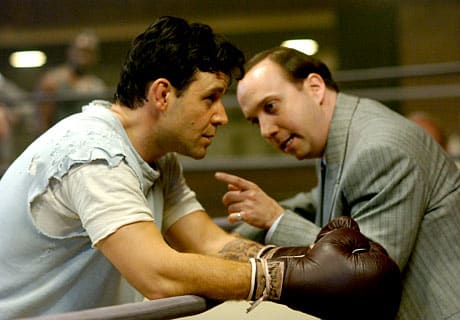Just three months after Clint Eastwood's Million Dollar Baby conquered all things Oscar, another '70s-icon-turned-award-winning-director has taken on one of Hollywood's most exhausted topics: boxing. Ron Howard re-teams with his A Beautiful Mind crew (writer Akiva Goldsman, actor Russell Crowe and producer Brian Grazer) to bring the true story of Depression-era boxer Jim Braddock to the screen in Cinderella Man.
Cinderella Man quickly distinguishes itself from its predecessors, in that it is just as much a story about the hardships of the Depression as it is a story about boxing. Boxing becomes a metaphor for hope in a time when little existed and, much like Baby, is a highly conventional but genuinely moving tribute to the human spirit.
Howard, an overrated director whose best films are often examples of conventions at their finest, perhaps has crafted his best film. Though Cinderella Man seems to go out of its way to feel clichéd (with the long-suffering wife, the underdeveloped boxing manager and the "underdog eventually triumphing" plotline at its core), its wonderful performances and exceptional stylistic qualities allow for its flaws to be all but ignored. While Renee Zelwegger is underwhelming as his wife, Crowe plays Braddock with remarkable style and grace. His accent is pitch-perfect and he allows the audience to truly find themselves emotionally involved in his story. After nearly a decade of Hollywood films, Crowe is proving himself worthy of classification as one of this era's finest actors.
Like most of Howard's films, Cinderella Man is a respectably flawed piece of filmmaking that is probably one of the only Hollywood films released this summer that will be worth any sort of accolades. It might just be the Rocky for our time: unoriginal, conventional and clichéd but very entertaining and heart-warming nonetheless. (Universal Pictures)
Cinderella Man quickly distinguishes itself from its predecessors, in that it is just as much a story about the hardships of the Depression as it is a story about boxing. Boxing becomes a metaphor for hope in a time when little existed and, much like Baby, is a highly conventional but genuinely moving tribute to the human spirit.
Howard, an overrated director whose best films are often examples of conventions at their finest, perhaps has crafted his best film. Though Cinderella Man seems to go out of its way to feel clichéd (with the long-suffering wife, the underdeveloped boxing manager and the "underdog eventually triumphing" plotline at its core), its wonderful performances and exceptional stylistic qualities allow for its flaws to be all but ignored. While Renee Zelwegger is underwhelming as his wife, Crowe plays Braddock with remarkable style and grace. His accent is pitch-perfect and he allows the audience to truly find themselves emotionally involved in his story. After nearly a decade of Hollywood films, Crowe is proving himself worthy of classification as one of this era's finest actors.
Like most of Howard's films, Cinderella Man is a respectably flawed piece of filmmaking that is probably one of the only Hollywood films released this summer that will be worth any sort of accolades. It might just be the Rocky for our time: unoriginal, conventional and clichéd but very entertaining and heart-warming nonetheless. (Universal Pictures)
